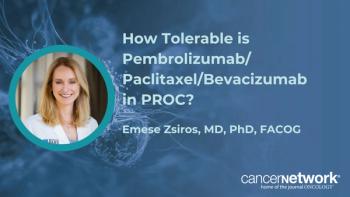
Study in Mice Shows Promise for Resveratrol in Ovarian Cancer
A mouse study found that resveratrol has a significant antitumor effect in an ovarian cancer model, and also suppressed tumor regrowth following cisplatin.
A mouse study found that resveratrol has a significant antitumor effect in an ovarian cancer model. The molecule also suppressed tumor regrowth following treatment with cisplatin, suggesting it could be used to prolong disease-free survival if confirmed in human ovarian cancer patients.
“We have found that although resveratrol can induce apoptotic cell death, it can also induce autophagocytic cell death, and inhibits glucose uptake in ovarian cancer cells in vitro,” wrote J. Rebecca Liu, MD, of the University of Michigan Health System in Ann Arbor, and colleagues. “We hypothesized that because resveratrol can induce cell death through a mechanism distinct from apoptosis, it may provide a therapeutic advantage in the management of chemoresistant ovarian cancer.”
The researchers used a fluorescent xenograft mouse model of ovarian cancer. The mice were treated with cisplatin, resveratrol, or vehicle control, and were assessed using whole-body imaging, micro-positron emission tomography, and transmission electron microscopy for resected tissue. The results of the study were
Both cisplatin and resveratrol resulted in significantly smaller tumors than in the control mice. This was true for both drugs at 17 days (P = .0007 for cisplatin vs control; P = .0003 for resveratrol vs control) and at 21 days (P = .0002 and P = .001, respectively). There were no significant differences between the cisplatin- and resveratrol-treated mice.
In another set of mice with ovarian cancer, cisplatin was administered but then withdrawn before complete regression of the tumor was observed. Resveratrol administered at that point resulted in reduced tumor regrowth compared with control mice, at days 16 (P = .008), 23 (P = .011), and 25 (P = .005).
The study also found that resveratrol yielded a marked decrease in tumor uptake of glucose compared with controls, and resected tissue showed induction of autophagy in the resveratrol-treated tumors.
“The results of the current study demonstrate that resveratrol has significant antineoplastic activity and suppresses glucose metabolism in a xenograft mouse model of ovarian carcinoma,” the authors concluded. “These properties suggest that resveratrol, and compounds similar to this phytoalexin, have therapeutic potential in the treatment of epithelial ovarian carcinoma.”
Newsletter
Stay up to date on recent advances in the multidisciplinary approach to cancer.













































